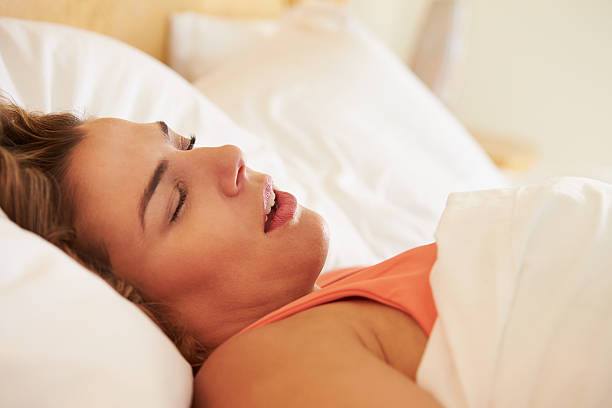Millions of people snore, but except for keeping someone else awake at night, is snoring a problem? It may or may not be. Some people snore just occasionally. But if the snoring is chronic and loud, it can cause daytime fatigue and irritability. Some snores can exceed 90 decibels, the government limit for noise in the workplace. This may indicate obstructive sleep apnea, a serious medical condition.
Men who snore largely outnumber women. Men typically start to snore in their late 30s and 40s, and the snoring intensifies after the age of 50. Among older people, there may actually be more snorers than non-snorers. And with menopause, the risk of snoring among women increases. Snoring is also more prevalent among overweight persons.
Children between the ages of 3 and 13 can snore if they have large tonsils and adenoids, or when they have a bad cold. As they mature, most will stop snoring.
Table of Contents
What causes snoring?

Snoring occurs mostly during periods of deep sleep. The sound comes from the vibration of soft tissues in the airway when you breathe. Snoring can be caused by anything that narrows the upper air passages. This can happen when nasal passages are congested from allergies or a cold, or when they are dried out from, for instance, sleeping in an overheated room. Nasal passages can also be blocked when you sleep on your back and your tongue or soft tissues in the back of your throat flop back or rattle as your breath. Drinking alcohol before bed can also bring on snoring by relaxing muscles in the throat.
Medical conditions such as nasal polyps, enlarged tonsils or adenoids, and a deviated septum can all cause snoring. Obesity may also cause snoring.
What if you do nothing?
In most cases habitual snoring doesn’t disappear on its own. If you have a bedmate who can tolerate it, and if you are getting a good night’s sleep, then there is no need to correct it. However, if loud snoring or aborted breathing is part of your snoring pattern, and if you find that you are drowsy during the day, you may have sleep apnea, which requires treatment. Sleep apnea increases the risk for a host of ailments, including high blood pressure.
Home remedies for snoring
If snoring annoys your bedmate, try these techniques to stop it.
- Avoid heavy meals and alcohol within three hours of bedtime. Eating heavily before turning in, or drinking alcohol causes greater-than-normal relaxation of the throat muscles, which may cause a non-snorer to snore.
- Avoid tranquilizers, sleeping pills, and antihistamines before bedtime. Most of these medications relax throat-muscle tone, just like alcohol, and can cause snoring.
- Lose weight if you are obese. Snoring may be linked to increased fat in the structures around the throat, which diminishes the size of the air passages. If you have a tendency to snore, it will get worse when you gain weight.
- Avoid sleeping on your back. This position may lead to snoring because the tongue falls back and presses against the top of the airways. The side is the ideal posture for sleeping.. However, for heavy snorers, sleep position has no effect; they will snore in all positions. Positioning a body pillow against your back may help you stay on your side. You may even attach a tennis ball to the inside of your pyjamas. (A rolled-up pair of socks will also do the trick.) Every time you roll over on your back, you’ll become uncomfortable and will roll back on your side.
- Elevate your head when sleeping on your back. You can try a wedge pillow that can elevate your head and neck some 10 inches.
- Seek treatment for problems that cause nasal obstruction. If you have allergies, contact an allergy specialist for testing and treatment. If you have nasal congestion due to a cold, try a saline nasal spray or use a decongestant short-term.
- Freshen bedroom air. When the room is hot and dry, nasal passages become clogged during sleep, and this often leads to snoring. Keep your windows open and, if necessary, use a humidifier to keep the nasal passages moist while you sleep.
- If you smoke, quit. Along with its many destructive consequences, smoking has an irritant effect that causes mucus buildup, inflammation, and swelling of the pharynx, as well as bronchial congestion, all of which can contribute to snoring.
How to prevent snoring
See the home remedies listed above.
Anti-snoring devices have become a growth industry. Nasal dilators, over-the-counter jaw retainers and mouthpieces, and even herbal pills, nasal sprays, and contoured pillows are touted as cures. Which of these works? Who knows? For sure, forget the pills and sprays. It’s hit or miss with pillows as to whether any of them can extend your neck while you sleep and, therefore, reduce snoring.
There are many nasal dilators—Max-Air Nose Cones, Theravent, and Breathe-Right, to name a few—available in drugstores and online. Some are small adhesive strips placed across the nose or a soft cone placed just inside your nostrils at night. They all are designed to pull the nostrils open slightly, thereby reducing resistance in the nasal airways. Certainly these devices are harmless and worth a try, especially for those whose snoring is due to certain types of nasal obstruction. But they won’t help all snorers—and there’s no evidence they will relieve sleep apnea.
When to call your doctor about snoring
Call your doctor if you are told that you snore loudly and that your snoring is punctuated by quiet intervals of a few seconds to two minutes, followed again by a gasp or snort and loud snoring. These signs could indicate sleep apnea. Also contact your doctor if the self-help measures fail to stop you from snoring and if the snoring regularly interferes with your partner’s sleep.
What your doctor will do
After a complete physical exam to rule out a physical obstruction, your doctor may recommend a sleep study, especially if sleep apnea is suspected. If you are diagnosed with sleep apnea or chronic snoring, your doctor may suggest that you use a continuous positive airway pressure device (CPAP) at night. Corrective surgery may be an option if all else fails. As with all surgical procedures, get a second opinion.




